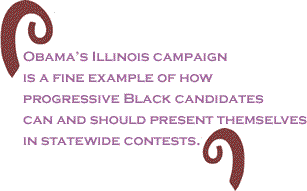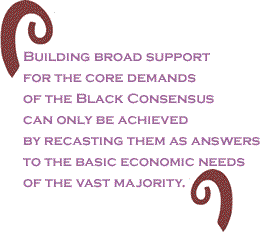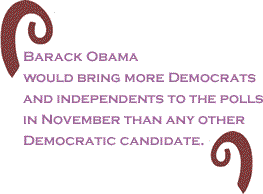
|
|||||||||||||||||||||
|
Serious black activists in the electoral arena rarely need ask themselves what it is that African Americans want. The range of political views held among African Americans – what we have called the Black Consensus – is remarkably consistent across regions, income levels and generations, and solidly anchors the leftward end of American political discourse. The unanswered question has always been: How do we build and mobilize the broad support across racial lines necessary to enact the progressive public policies at the core of the Black Consensus. Illinois State Senator
Barack Obama, a candidate in the March 16 Illinois Democratic
primary for the US Senate, framed the question this way in his
dialogue with
We at Candidate Obama addressed public meetings opposing the invasion of Iraq in the months before it happened, and maintains a principled critique of the nation’s lunge into militarism and illegal pre-emptive war. He has appeared at dozens of community forums around the state discussing the nuts, bolts and ramifications of the Patriot Act. He has inveighed against the executive branch’s newly asserted power to detain citizens of this or any other country indefinitely on military bases and law-free zones like Guantanamo, and more recently, Central Africa. Obama supported single-payer health care proposals in the Illinois State Senate on the basis that medical care is a human right. He steadfastly insists that provisions of Corporate Rights treaties – misleadingly labeled “free trade” agreements in the corporate media – such as NAFTA must be renegotiated to protect workers and the environment.
Barack Obama knows that building broad support for the core demands of the Black Consensus can only be achieved by recasting them as answers to the basic economic needs of the vast majority of this country’s citizens. While nobody will benefit more than African Americans from guarantees that public education be adequately and equally funded across this nation, the provision of equal and adequate funding for public schools is not a “black” issue. The same is true with regard to universal single-payer health care, retirement security, and the rights to organize unions, bargain collectively and strike. Throughout the primary election campaign Obama successfully emphasized the “bright line” issues that define the democratic wing of the Democratic party. In so doing, he has proved, like Howard Dean, that if you really intend to lead, you must move the center instead of moving rightward to it.
We at
If |
March
11
2004 |
|||||||||
|
|||||||||
|
|
|||||||||
| Printer Friendly Version | |||||||||
 |
|||||||||
| |
|||||||||
| |
|||||||||




























